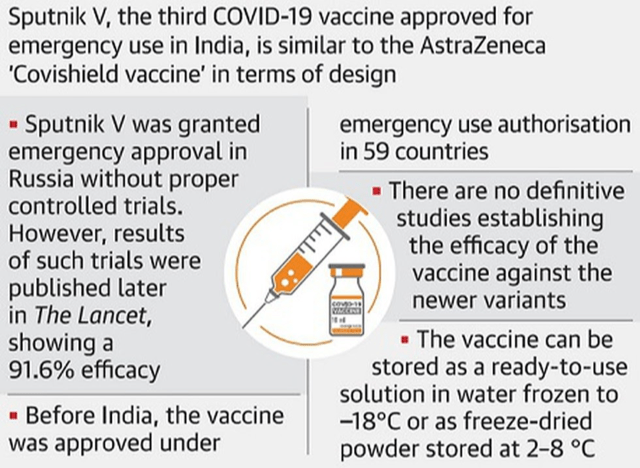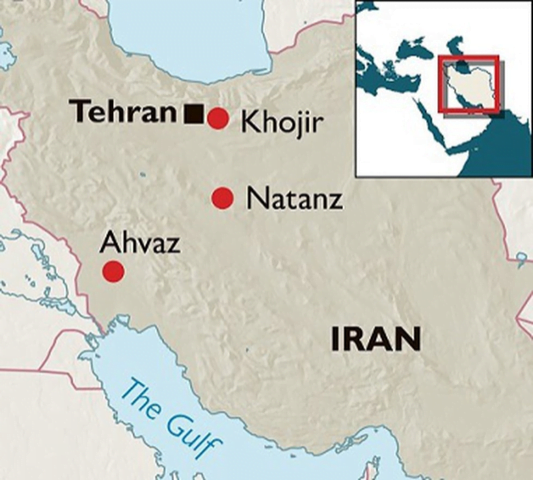IASbaba's Daily Current Affairs Analysis
Archives
(PRELIMS + MAINS FOCUS)
Sputnik V recommended for emergency use
Part of: GS Prelims and GS – II – Health
In news
- Russia’s COVID-19 vaccine — Sputnik V — has been recommended for emergency use authorisation in India following a meeting of the Subject Expert Committee (SEC).

Key takeaways
- If approved by the Drug Controller General of India (DCGI), Sputnik V would be the third vaccine to be made available in India after the Serum Institute of India’s Covishield and Bharat Biotech’s Covaxin.
- Sputnik V is developed by Russia’s Gamaleya Research Institute of Epidemiology and Microbiology
- It claims to be one of the three vaccines in the world with efficacy of over 90%.
- The vaccine supplies for the global market will be produced by the Russian Direct Investment Fund (RDIF) international partners in India, Brazil, China, South Korea and other countries.
SC’s judgement on Terror Financing
Part of: GS Prelims and GS – II – Judiciary & GS-III – Terrorism
In news
- Extortion money paid to a terrorist organisation to protect one’s business is not terror funding, the Supreme Court has said in a judgment.
Key takeaways
- With this, Supreme Court granted bail to a Jharkhand coal transporter who had paid huge amounts to the Tritiya Prastuti Committee (TPC), a breakaway faction of the CPI (Maoist).
- The Financial Action Task Force on Money Laundering (FATF) has made recommendations to members relating to counter terrorism financing (CTF).
- It has created a Blacklist and Greylist of countries that have not taken adequate CTF action.
- FATF is an intergovernmental organisation founded in 1989 on the initiative of the G7 to develop policies to combat money laundering.
- In 2001, its mandate was expanded to include terrorism financing.
Indus and Ganges River Dolphins, two separate species
Part of: GS Prelims and GS – III – Environment; Conservation; Biodiversity
In news
- In a recent research, detailed analysis of South Asian river dolphins has revealed that the Indus and Ganges River dolphins are not one, but two separate species.
Key takeaways
- Currently, Indus and Ganges River dolphins are classified as two subspecies under Platanista gangetica.
- But according to a new study, this classification needs a revision.
- The study estimates that Indus and Ganges river dolphins may have diverged around 550,000 years ago.
Conservation status
- The Indus and Ganges River dolphins are both classified as ‘Endangered’ species by the IUCN.
- The Ganges dolphin is a Schedule I animal under the Indian Wildlife (Protection) Act 1972
- It has been included in Annexure – I of Convention on International Trade in Endangered Species (CITES).
Iran nuclear Programme
Part of: GS Prelims and GS – II – International Relations
In news
- Iran has started up advanced uranium enrichment centrifuges in a breach of its undertakings under a troubled 2015 nuclear deal, days after the start of talks on rescuing the accord.

Key takeaways
- Iran’s President Hassan Rouhani inaugurated the three cascades of 164 IR-6 centrifuges, 30 IR-5 and another 30 IR-6 devices at Iran’s Natanz uranium enrichment plant.
- Iran’s latest move to step up uranium enrichment follows an opening round of talks in Vienna with representatives of the remaining parties to the nuclear deal on bringing the U.S. back into it
Do you know?
Vienna Talks
- The Vienna talks are focused on lifting crippling economic sanctions Trump reimposed on Iran.
- It also focuses on bringing Iran back into compliance after it responded by suspending several of its own commitments.
- Iran has demanded that the U.S. first lift all sanctions imposed by Trump, which include a sweeping unilateral ban on its oil exports, before it falls back in line with obligations it suspended.
- USA has demanded movement from Tehran in return
Advanced Antiquities Management System (AAMS)
Part of: GS Prelims and GS – I – Culture
In news
- The Directorate of Archives and Archaeology (DAA) of the Goa government inaugurated the Advanced Antiquities Management System (AAMS).
- It has claimed that it is the first such system in India for storage of antiquities.
Key takeaways
- The system catalogues 83 antiquities at present.
- Aim: Providing quick information about an antiquity linked to the software, saving storage space and ensuring improved preservation of the objects of historical significance.
- AAMS is a software-driven automated storage used for the storage of various objects.
- So far it has been used for storage of industrial Equipment.
- The AAMS will ensure safety of antiquities, clean storage space, access control and data management and also enhance utilisation of space.
- It is placed at Goa’s DAA in Panaji.
Miscellaneous
Umngot River
-
Umngot is considered India’s clearest river.
- Umngot flows through Dawki, a town in West Jaintia Hills district, Meghalaya.
- The river is the natural boundary between Ri Pnar (of Jaintia Hills) and Hima Khyrim (of Khasi Hills).
- Dawki Bridge is a suspension bridge over the Umngot River.
(Mains Focus)
GOVERNANCE/ SECURITY
Topic:
- GS-2: Government policies and interventions for development in various sectors and issues arising out of their design and implementation.
- GS-2: Statutory, regulatory and various quasi-judicial bodies
Personal Data Protection Bill
Context: The pandemic has forced more people to participate in the digital economy that has brought focus into the Personal Data Protection Bill drafted by Union Government.
Unfortunately, the existing data protection regime in India does not meet this standard. Current data protection regime falls short of providing effective protection to users and their personal data.
Data Protection – Issues
- Increasing Breaches: The number of personal data breaches from major digital service providers has increased. Robust data protection regimes are necessary to prevent such events and protect users’ interests.
- Misuse of Terms & Conditions: Entities could override the protections in the regime by taking users’ consent to processing personal data under broad terms and conditions. This is problematic given that users might not understand the terms and conditions or the implications of giving consent.
- Data Privacy: Frameworks emphasise data security but do not place enough emphasis on data privacy.
- Data Processing: While entities must employ technical measures to protect personal data, they have weaker obligations to respect users’ preferences in how personal data can be processed. Entities could use the data for purposes different to those that the user consented to.
- Checks on Government Collection of Data: The data protection provisions under the existing IT Act also do not apply to government agencies. This creates a large vacuum for data protection when governments are collecting and processing large amounts of personal data.
- The regime seems to have become antiquated and inadequate in addressing risks emerging from new developments in data processing technology.
How does the Personal Data Protection Bill, 2019 address above issues?
It could play a big role in providing robust protections to users and their personal data.
- Applicable to all: The Bill seeks to apply the data protection regime to both government and private entities across all sectors.
- Covers Data Privacy: The Bill seeks to emphasise data security and data privacy. While entities will have to maintain security safeguards to protect personal data, they will also have to fulfill a set of data protection obligations and transparency and accountability measures that govern how entities can process personal data to uphold users’ privacy and interests.
- Autonomy to Users: The Bill seeks to give users a set of rights over their personal data and means to exercise those rights.
- Independent Regulator: The Bill seeks to create an independent and powerful regulator known as the Data Protection Authority (DPA). The DPA will monitor and regulate data processing activities to ensure their compliance with the regime. More importantly, the DPA will give users a channel to seek redress when entities do not comply with their obligations under the regime.
Concerns with the Bill
- Several provisions in the Bill create cause for concern about the regime’s effectiveness. These provisions could contradict the objectives of the Bill by giving wide exemptions to government agencies and diluting user protection safeguards.
- Central government can exempt any government agency from complying with the Bill. Government agencies will then be able to process personal data without following any safeguard under the Bill. This could create severe privacy risks for users.
- Users could find it difficult to enforce various user protection safeguards (such as rights and remedies) in the Bill. The Bill threatens legal consequences for users who withdraw their consent for a data processing activity.
- This could discourage users from withdrawing consent for processing activities they want to opt out of.
- Additional concerns also emerge for the DPA as an independent effective regulator that can uphold users’ interests.
(TEST YOUR KNOWLEDGE)
Model questions: (You can now post your answers in comment section)
Note:
- Correct answers of today’s questions will be provided in next day’s DNA section. Kindly refer to it and update your answers.
- Comments Up-voted by IASbaba are also the “correct answers”.
Q.1 Consider the following statements regarding Umngot river:
- It is India’s clearest river.
- It is situated in Arunachal Pradesh.
Which of the above is or are correct?
- 1 only
- 2 only
- Both 1 and 2
- Neither 1 nor 2
Q.2 Which of the following is incorrect regarding Ganges Dolphins?
- Ganges River dolphins are classified as ‘Endangered’ species by the IUCN.
- It is a Schedule I animal under the Indian Wildlife (Protection) Act 1972
- It has been included in Annexure – I of Convention on International Trade in Endangered Species (CITES).
- None of the above
ANSWERS FOR 12th April 2021 TEST YOUR KNOWLEDGE (TYK)
| 1 | B |
| 2 | A |
| 3 | B |
| 4 | C |
Must Read
India and the great power triangle of Russia, China and US:
On Nepal’s Democracy:
On U.S. and Iran resolving nuclear crisis:











